(完整版)第三人称单数讲义及练习
最全第三人称单数讲解和练习

How do you go to scy .
01
bicycle
____
03
car
I to school.
02
walk
____
04
3.How do they go to work?
My father works.
I live near school. I walk.
Kim, how do you go to school?
By car. My dad drives me.
How do you go to school, Steven?
Do you walk to school, Danny?
No. I ride my bicycle!
He is a businessman.
He has a car.
He drives to work.
My mother is a doctor. How does she go to work? By bus.
My aunt is a teacher. She works in a school. She goes to work on her bicycle.
6. he swim every afternoon? A. Do B. Does C. Doing 7. Tom likes in the classroom. A. singing B. sing C. to singing 8. –Does Sally like swimming? --No, she . 9. Peter and Mary milk every day. A. drink B. drinking C. drinks 10. they read English every day? A. Does B. To C. Do
英语中的第三人称单数讲义

一.什么是第三人称单数?1.人称代词he, she, it是第三人称单数。
如:He likes watching TV. 他喜欢看电视。
She has lunch at twelve. 她十二点吃午餐。
It looks like a cat. 它看起来像只猫。
2.单个人名、地名或称呼作主语时是第三人称单数。
如:①Han Mei looks like her mother.韩梅看起来像她的母亲。
②Beijing is in China. 北京在中国。
③Uncle Wang often makes cakes. 王叔叔经常做蛋糕。
3.单数可数名词或"this / that / the单数可数名词作主语时,是第三人称单数。
如:①A horse is a useful animal. 马是有用的动物②This book is yours. 这本书是你的。
③That car is red. 那辆小汽车是红色的。
④The cat is Lucy's. 这只猫是露茜的4.不定代词someone, somebody, nobody, everything, something等及指示代词this, that作主语时,是第三人称单数。
如:① Everyone is here. 大家到齐了。
②There is something wrong with the watch.这块手表有毛病。
③This is a pen. 这是一支钢笔。
④That is an eraser. 那是一块橡皮擦。
5.不可数名词作主语时为第三人称单数。
如:①The milk is in the glass. 牛奶在玻璃杯里。
②The bread is very small. 那面包很小。
6.当数字或字母作主语时,看作第三人称单数。
如:①"6" is a lucky number. "6"是个吉利数字。
第三人称单数 讲解及练习
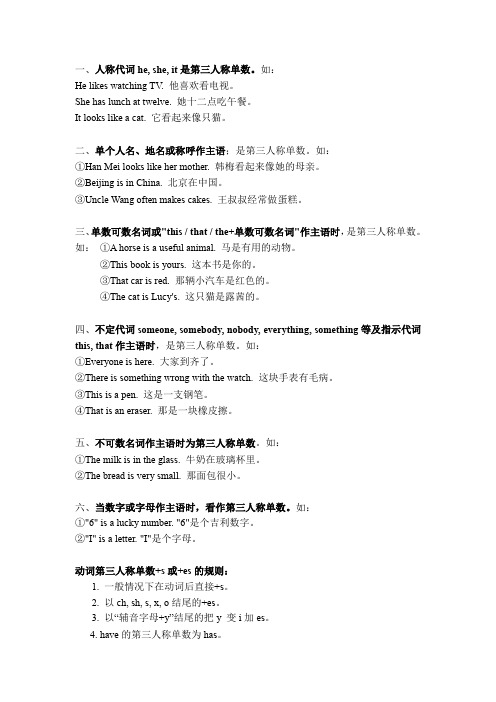
一、人称代词he, she, it是第三人称单数。
如:He likes watching TV. 他喜欢看电视。
She has lunch at twelve. 她十二点吃午餐。
It looks like a cat. 它看起来像只猫。
二、单个人名、地名或称呼作主语;是第三人称单数。
如:①Han Mei looks like her mother. 韩梅看起来像她的母亲。
②Beijing is in China. 北京在中国。
③Uncle Wang often makes cakes. 王叔叔经常做蛋糕。
三、单数可数名词或"this / that / the+单数可数名词"作主语时,是第三人称单数。
如:①A horse is a useful animal. 马是有用的动物。
②This book is yours. 这本书是你的。
③That car is red. 那辆小汽车是红色的。
④The cat is Lucy's. 这只猫是露茜的。
四、不定代词someone, somebody, nobody, everything, something等及指示代词this, that作主语时,是第三人称单数。
如:①Everyone is here. 大家到齐了。
②There is something wrong with the watch. 这块手表有毛病。
③This is a pen. 这是一支钢笔。
④That is an eraser. 那是一块橡皮擦。
五、不可数名词作主语时为第三人称单数。
如:①The milk is in the glass. 牛奶在玻璃杯里。
②The bread is very small. 那面包很小。
六、当数字或字母作主语时,看作第三人称单数。
如:①"6" is a lucky number. "6"是个吉利数字。
完整版)小学动词第三人称单数讲解及练习

完整版)小学动词第三人称单数讲解及练习一般现在时是指在现在发生的动作或状态。
它有三个基本用法:1.描述事物或人的特征和状态,例如“天空是蓝色的”。
2.表示经常性或惯性的动作,例如“我每天六点起床”。
3.描述客观现实,例如“地球绕着太阳转”。
在一般现在时中,当主语是第三人称单数时,谓语动词要用第三人称单数形式,即常在动词原形后加-s或-es。
常见的时间状语有always,every week (day。
year。
month…),once a week,every…,sometimes,at…,on Sunday,usually,often,never,hardly等。
主语可以是人称代词he。
she。
it,单个人名、地名或称呼,单数可数名词或“this / that / the+单数可数名词”,以及不定代词someone。
somebody。
nobody。
everything。
something等及指示代词this。
that。
例如,“他喜欢看电视”、“XXX看起来像她的母亲”、“马是有用的动物”、“这本书是你的”、“这只猫是XXX的”、“大家到齐了”、“这块手表有毛病”、“这是一支钢笔”。
④This is an eraser.XXX is used as the subject。
it takes the third person singular form。
For example:①The milk is in the glass.②The bread is very small.When a number or letter is used as the subject。
it is treated as third person XXX:①"6" XXX.②"I" XXX.The rule for adding -s or -es to verbs in the third person singular form is as follows:1.In general。
中考英语复习语法专题- 动词第三人称单数讲解及练习
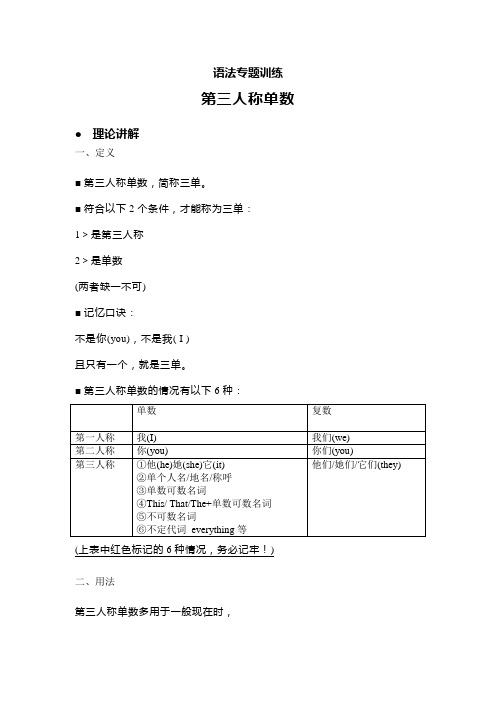
语法专题训练第三人称单数理论讲解一、定义(上表中红色标记的6种情况,务必记牢!) 二、用法第三人称单数多用于一般现在时,当主语符合第三人称单数时,动词也要变成第三人称单数形式。
即:主语三单,动词三单。
如:They often play football on Sundays.(主语They不符合三单,动词用原形)She often plays football on Sundays.(主语She符合三单,动词用三单形式)Lucy and I often go running on Sundays.(主语Lucy and I 不符合三单,动词用原形)Lucy often goes running on Sundays.(主语Lucy符合三单,动词用三单形式)三、动词三单变化■动词三单的规则变化:1>一般情况下,词尾直接加-s如:look-looks want-wants2>以s、x、o、ch、sh结尾,加-es如:go-goes watch-watches3>以辅音字母+y 结尾,变y为i , 加-es如:fly-flies study-studies■动词三单的不规则变化如:have-has实践练习一、判断下列主语是否符合三单。
符合写T,否则写F。
( )1. My parents( )3. Mr Wang( )5. Tom( )7. They( )9. This dog( )2. He( )4. Everything( )6. Those ships( )8. The meat( )10. Her aunt( )11. The elephant ( )13. Three eggs( )15. Children’s Day ( )17. Peter and his family ( )19.The ugly duckling ( )21. Mother Duck ( )23. The plant( )25. The people( )27. The sun( )29. These grapes ( )31. Her mother ( )33. The girl( )35. The second pea( )37. The weather( )39. Father Christmas ( )41. Peter’s nose( )12. Children( )14. Joe’s favorite story ( )16. Kitty and Alice( )18. The underground station ( )20. The photo of my family ( )22. Different roads( )24. Some animals( )26. Many interesting stories ( )28. A pair of shoes( )30. Your school( )32. All our books( )34. students( )36. Our house( )38. A lot of shops( )40. Mr. Green and Mr. Smith ( )42. Kitty’s little brother二、写出下列动词的三单形式。
动词第三人称单数的变化规则讲解及习题练习(附答案)

动词第三人称单数的变化规则讲解及习题练习(附答案)1. 大部分单词可以直接在动词后: +s例:like -- like splay -- play swork--work sread--read swrite--write s发音规则:所加的“s”在清辅音后,发【s】,works在浊辅音及元音后,发【z】,plays在d 后与s 一起发【dz】,reads在t 后与s 一起发【ts】,writes2. 以s, x, sh, ch, 结尾的动词: +es例:watch -- watch esbrush-- brush eswash--wash es发音规则:词尾加的“es”,发【iz】3. 以辅音+o 结尾的动词: +es例:go -- go esdo -- do es发音规则:词尾加的“es”,发【z】,does4. 以辅音+y 结尾的动词: 变y 为i+es例:fly -- fl iesstudy -- stud iescarry--carr ies发音规则:词尾加的“es”,发【iz】,carries5. 不规则变化:例:have -- hasbe 动词的单三形式是:is练习题1. 写出下列动词第三人称单数。
drink ________ go _______stay ________ make _______look ________have_______pass_______ carry ________come_______ watch______plan_______ fly ________study_______ brush________do_________ teach_______2. 用所给单词的适当形式填空。
(1) He ______ (go) to school by bus every morning.(2) Jim _______ (have) many toys.(3) Lucy ______ (study) very hard.She ______ (be) never late for school.(4) Ken _______ (like) his father very much.答案:1.drinks goes stays makes looks has passes carries comes watches plans flies studies brushes does teaches2. (1) goes (2) has (3) studies is (4) likes。
第三人称单数用法讲解及练习题
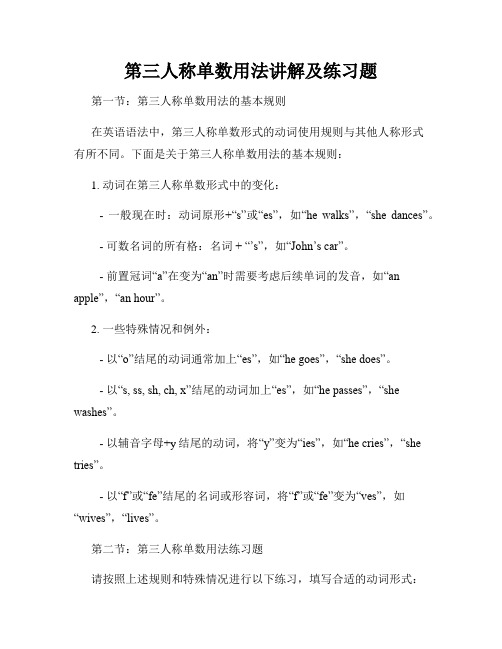
第三人称单数用法讲解及练习题第一节:第三人称单数用法的基本规则在英语语法中,第三人称单数形式的动词使用规则与其他人称形式有所不同。
下面是关于第三人称单数用法的基本规则:1. 动词在第三人称单数形式中的变化:- 一般现在时:动词原形+“s”或“es”,如“he walks”,“she dances”。
- 可数名词的所有格:名词+ “’s”,如“John’s car”。
- 前置冠词“a”在变为“an”时需要考虑后续单词的发音,如“an apple”,“an hour”。
2. 一些特殊情况和例外:- 以“o”结尾的动词通常加上“es”,如“he goes”,“she does”。
- 以“s, ss, sh, ch, x”结尾的动词加上“es”,如“he passes”,“she washes”。
- 以辅音字母+y结尾的动词,将“y”变为“ies”,如“he cries”,“she tries”。
- 以“f”或“fe”结尾的名词或形容词,将“f”或“fe”变为“ves”,如“wives”,“lives”。
第二节:第三人称单数用法练习题请按照上述规则和特殊情况进行以下练习,填写合适的动词形式:1. Mary _________ (watch) TV every evening.2. The cat _________ (jump) onto the table.3. David often _________ (play) basketball after school.4. The sun _________ (shine) brightly in the sky.5. My sister _________ (study) English at university.6. He _________ (fix) his car yesterday.7. The book _________ (belong) to Sarah.8. The dog _________ (bark) at the mailman.9. The teacher _________ (teach) math in the morning.10. The children _________ (have) fun at the park.答案:1. watches2. jumps3. plays4. shines5. studies6. fixed7. belongs8. barks9. teaches10. have第三节:总结和进一步练习通过上述练习可以看出,第三人称单数动词形式的使用需要注意变化规则和特殊情况。
第三人称单数超详细带练习题ppt课件
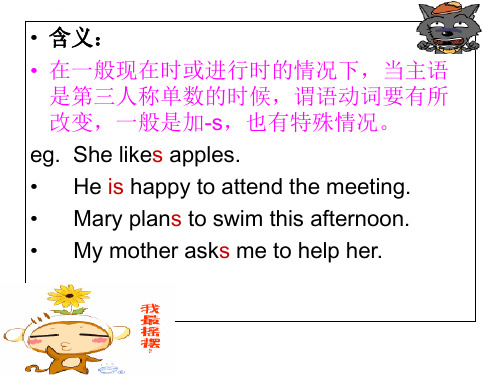
1. 一般现在时或是现在进行时 eg. He is playing basketball now. she walks after supper everyday.
2. 主语为第三人称单数,单数名词当主语时 eg. She, he, it, Lucy, Kate, Li Ming.
篮球比赛是根据运动队在规定的比赛 时间里 得分多 少来决 定胜负 的,因 此,篮 球比赛 的计时 计分系 统是一 种得分 类型的 系统
到底什么在什么情况下要把动词变成单三呢?
篮球比赛是根据运动队在规定的比赛 时间里 得分多 少来决 定胜负 的,因 此,篮 球比赛 的计时 计分系 统是一 种得分 类型的 系统
篮球比赛是根据运动队在规定的比赛 时间里 得分多 少来决 定胜负 的,因 此,篮 球比赛 的计时 计分系 统是一 种得分 类型的 系统
人称代词
I We you you he she it they me us you you him her it them
篮球比赛是根据运动队在规定的比赛 时间里 得分多 少来决 定胜负 的,因 此,篮 球比赛 的计时 计分系 统是一 种得分 类型的 系统
七. 当数字或字母作主语时,看作第三人称单数。
"6"
a lucky number.
"6"是个吉利数字。
篮球比赛是根据运动队在规定的比赛 时间里 得分多 少来决 定胜负 的,因 此,篮 球比赛 的计时 计分系 统是一 种得分 类型的 系统
"I"
a letter.
"I"是个字母.
篮球比赛是根据运动队在规定的比赛 时间里 得分多 少来决 定胜负 的,因 此,篮 球比赛 的计时 计分系 统是一 种得分 类型的 系统
(完整)动词第三人称单数的变化规则及练习

动词第三人称单数的变化规则及练习一.写出下列动词的第三人称单数.drink ________ go _______ stay ________ make ________look______ have_______ pass_______ carry_______ come______watch______ plant_______ fly________ study_______brush________ teach_______二.用括号内动词的适当形式填空。
1。
He often ________(have) dinner at home。
2。
Daniel and Tommy _______(be) in Class One。
3。
We _______(not watch) TV on Monday。
4。
Nick _______(not go) to the zoo on Sunday。
5. ______ they ________(like) the World Cup?6. What _______they often _______(do) on Saturdays?7。
_______ your parents _______(read) newspapers every day?8。
The girl _______(teach) us English on Sundays。
9. She and I ________(take) a walk together every evening.10。
There ________(be) some water in the bottle。
11. Mike _______(like) cooking。
12. They _______(have) the same hobby。
13。
My aunt _______(look) after her baby carefully。
第三人称单数讲解以及练习题
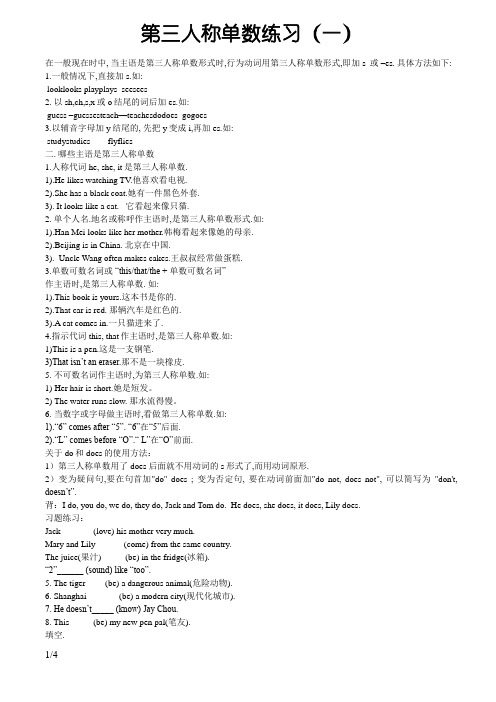
第三人称单数练习(一)在一般现在时中, 当主语是第三人称单数形式时,行为动词用第三人称单数形式,即加s 或–es. 具体方法如下: 1.一般情况下,直接加 s.如:looklooks playplays seesees2. 以 sh,ch,s,x或o结尾的词后加es.如:guess –guessesteach—teachesdodoes gogoes3.以辅音字母加y结尾的, 先把y变成i,再加 es.如:studystudies flyflies二. 哪些主语是第三人称单数1.人称代词he, she, it是第三人称单数.1).He likes watching TV.他喜欢看电视.2).She has a black coat.她有一件黑色外套.3). It looks like a cat. 它看起来像只猫.2. 单个人名.地名或称呼作主语时,是第三人称单数形式.如:1).Han Mei looks like her mother.韩梅看起来像她的母亲.2).Beijing is in China. 北京在中国.3). Uncle Wang often makes cakes.王叔叔经常做蛋糕.3.单数可数名词或“this/that/the + 单数可数名词”作主语时,是第三人称单数. 如:1).This book is yours.这本书是你的.2).That car is red. 那辆汽车是红色的.3).A cat comes in.一只猫进来了.4.指示代词this, that作主语时,是第三人称单数.如:1)This is a pen.这是一支钢笔.3)That isn’t an eraser.那不是一块橡皮.5. 不可数名词作主语时,为第三人称单数.如:1) Her hair is short.她是短发。
2) The water runs slow. 那水流得慢。
6. 当数字或字母做主语时,看做第三人称单数.如:1).“6” comes after “5”. “6”在“5”后面.2).“L” comes before “O”.“ L”在“O”前面.关于do和does的使用方法:1)第三人称单数用了 does 后面就不用动词的s形式了,而用动词原形.2)变为疑问句,要在句首加"do" does ; 变为否定句, 要在动词前面加"do not, does not", 可以简写为"don't, doesn’t”.背:I do, you do, we do, they do, Jack and Tom do. He does, she does, it does, Lily does.习题练习:Jack_______ (love) his mother very much.Mary and Lily______ (come) from the same country.The juice(果汁)_____ (be) in the fridge(冰箱).“2”______ (sound) like “too”.5. The tiger____ (be) a dangerous animal(危险动物).6. Shanghai_______ (be) a modern city(现代化城市).7. He doesn’t_____ (know) Jay Chou.8. This_____ (be) my new pen pal(笔友).填空.1.Let him _____(play)basketball.2.Everyone_____(know)what he really like.3.Tose girls____(be)my sister.4.That girl_____(call)me every Sunday.5.How___(do)she_____(spell)the word?否定句:在动词前+doesn't或don't.1.She_____ _____(do)her homework every day.2.He_____ _____(live)in Huanggang.3.He_____ _____(need)a pair of shoes.4.Danny_____ _____(see)the apple tree?5.She_____ _____(come)from America.6.The girl_____ _____(look)out of the window and sees many birds in the sky.7.Jenny runs home and_____ _____(sit)on the chair.一般疑问句:1._____the desk_____(have)four legs?Yes,it does.2._____she____(do)her homework every day?Yes,she does.3._____he_____(live)in Huanggang?No,he doesn't.4._____he_____(need)a pair of shoes?NO,he doesn't.5.Does Danny_____(see)the apple tree?6._____she_____(come)from America?Yes,she_____.7._____the girl_____(look)out of the window and sees many birds in the sky?No,she_____.8._____Jenny runs home and_____(sit)on the chair?• 1. [Do/Does]______ he watch TV at night? Yes, he does.• 2. [Do/Does]______ you go to school everyday? No, I don’t.• 3. [Do/Does]______ Jack and Peter like apples?• 4. [Do/Does]______ Tina go swimming on Sunday?• 5. [Do/Does]______they play football? Yes, they ___[do/does].• 6. [Do/Does]______ we have a good teacher? Yes, we ____[do/does].•7. [Do/Does]_____ they jump rope ? No, they ___[do not/does not].•8. [Do/Does]_____your dog walk in the zoo?•9. [Do/Does]____ I have a big nose?• No, you _____[do not/does not].•10. [Do/Does]____ your cats eat fish? Yes, they _____.[do/does].•11. [Do/Does]_____ their mothers go shopping? No, they ____[do not/does not].•12. I ___[do not/ does not] speak Japanese. [Do/Does] _____you speak Japanese? 用 have或has填空。
第三人称单数用法讲解及练习题
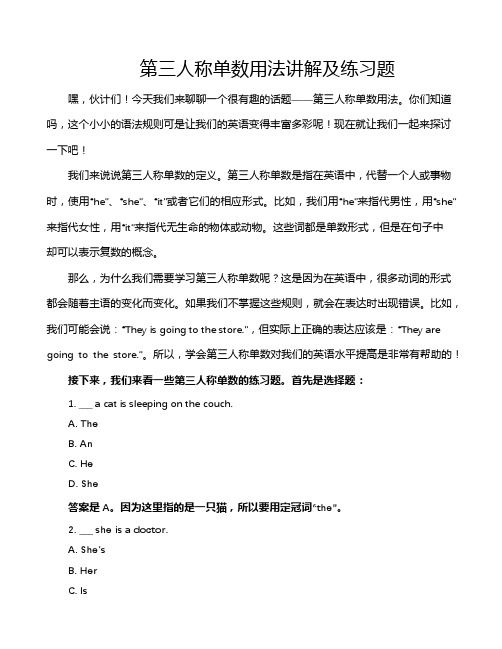
第三人称单数用法讲解及练习题嘿,伙计们!今天我们来聊聊一个很有趣的话题——第三人称单数用法。
你们知道吗,这个小小的语法规则可是让我们的英语变得丰富多彩呢!现在就让我们一起来探讨一下吧!我们来说说第三人称单数的定义。
第三人称单数是指在英语中,代替一个人或事物时,使用“he”、“she”、“it”或者它们的相应形式。
比如,我们用“he”来指代男性,用“she”来指代女性,用“it”来指代无生命的物体或动物。
这些词都是单数形式,但是在句子中却可以表示复数的概念。
那么,为什么我们需要学习第三人称单数呢?这是因为在英语中,很多动词的形式都会随着主语的变化而变化。
如果我们不掌握这些规则,就会在表达时出现错误。
比如,我们可能会说:“They is going to the store.”,但实际上正确的表达应该是:“They are going to the store.”。
所以,学会第三人称单数对我们的英语水平提高是非常有帮助的!接下来,我们来看一些第三人称单数的练习题。
首先是选择题:1. ___ a cat is sleeping on the couch.A. TheB. AnC. HeD. She答案是A。
因为这里指的是一只猫,所以要用定冠词“the”。
2. ___ she is a doctor.A. She'sB. HerC. IsD. He's答案是A。
因为这里要表达的是她的职业,所以要用缩写形式“she's”。
3. My sister and ___ brother like to play video games.A. heB. hisC. himD. they答案是A。
因为这里要表达的是我的兄弟姐妹,所以要用主格代词“my sister and ____ brother”。
好啦,练习题做完了,下面我们来举几个例子,看看第三人称单数在实际运用中的表现吧!例1:My friend and her dog are going on vacation tomorrow.(我的朋友和她的小狗明天要去度假。
动词第三人称单数变化规则及练习
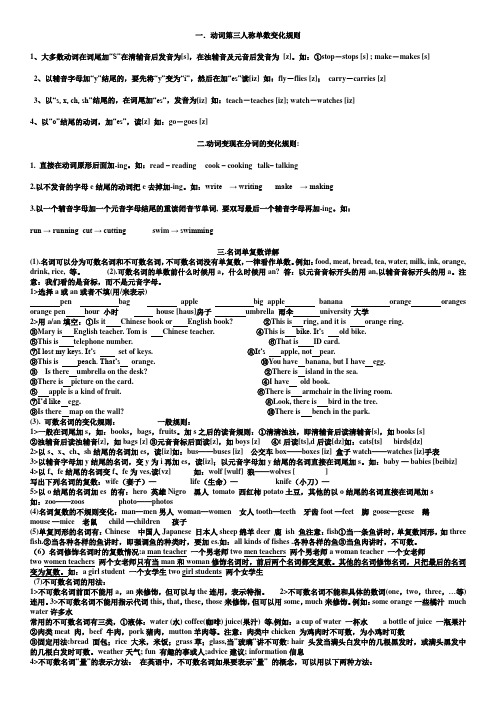
一.动词第三人称单数变化规则1、大多数动词在词尾加“S”在清辅音后发音为[s],在浊辅音及元音后发音为[z]。
如:①stop-stops [s] ; make-makes [s]2、以辅音字母加“y”结尾的,要先将“y”变为“i”,然后在加“es”读[iz] 如:fly-flies [z];carry-carries [z]3、以“s, x, ch, sh”结尾的,在词尾加“es”,发音为[iz] 如:teach-teaches [iz]; watch-watches [iz]4、以“o”结尾的动词,加“es”,读[z] 如:go-goes [z]二.动词变现在分词的变化规则:1. 直接在动词原形后面加-ing。
如:read – reading cook – cooking talk– talking2.以不发音的字母e结尾的动词把e去掉加-ing。
如:write → writing make → making3.以一个辅音字母加一个元音字母结尾的重读闭音节单词, 要双写最后一个辅音字母再加-ing。
如:run → running cut → cutting swim → swimming三.名词单复数详解(1).名词可以分为可数名词和不可数名词,不可数名词没有单复数,一律看作单数。
例如:food, meat, bread, tea, water, milk, ink, orange, drink, rice, 等。
(2).可数名词的单数前什么时候用a,什么时候用an? 答:以元音音标开头的用an,以辅音音标开头的用a。
注意:我们看的是音标,而不是元音字母。
1>选择a或an或者不填(用/来表示)pen bag apple big apple banana orange oranges orange pen hour 小时house [haus]房子umbrella 雨伞university大学2>用a/an填空:①Is it Chinese book or English book? ②This is ring, and it is orange ring.③Mary is English teacher. Tom is Chinese teacher. ④This is bike. It’s old bike.⑤This is telephone number. ⑥That is ID card.⑦I lost my keys. It’s set of keys. ⑧It’s apple, not pear.⑨This is peach. That’s orange. ⑩You have banana, but I have egg.③Is there umbrella on the desk? ②There is island in the sea.③There is picture on the card. ④I have old book.⑤apple is a kind of fruit. ⑥There is armchair in the living room.⑦I’d like egg. ⑧Look, there is bird in the tree.⑨Is there map on the wall? ⑩There is bench in the park.(3). 可数名词的变化规则:一般规则:1>一般在词尾加s,如:books,bags,fruits。
动词第三人称单数的变化规则及练习

动词第三人称单数的变化规则及练习本文介绍了动词第三人称单数的变化规则,包括直接+s、以s、x、sh、ch结尾的动词加es、以辅音+o结尾的动词加es、以辅音+y结尾的动词变为i+es等。
同时给出了一些动词的变化示例和练。
变化规则:1.直接在动词后+s,如like-likes,play-plays。
2.以s、x、sh、ch结尾的动词加es,如wash-washes。
3.以辅音+o结尾的动词加es,如go-goes。
4.以辅音+y结尾的动词变为i+es,如fly-flies。
动词短语示例:s:plays。
skips。
sings。
gives。
starts。
likes。
buys some toys。
gets up。
comes back home。
makes noodles。
eats lunch。
drinks coffee。
begins his class。
practises the piano。
es:watches TV。
brushes his teeth。
goes to bed。
goes to school。
does my homework。
does some reading。
y→ i+ es:fly → flies。
study → studies。
练:drink - drinks。
go - goes。
stay - stays。
make - makes。
look - looks。
have - has。
pass - passes。
carry - carries。
come - comes。
watch - watches。
plant - plants。
fly - flies。
study - studies。
brush - brushes。
do - does。
teach - teaches。
文章中还介绍了区分肯定句和否定句以及疑问句的常用表达方式,如I go to school every day和I don't go to school every day,He goes to school every day和He doesn't go to schoolevery day,Do you go to school every day?和Yes。
(完整版)第三人称单数专项练习
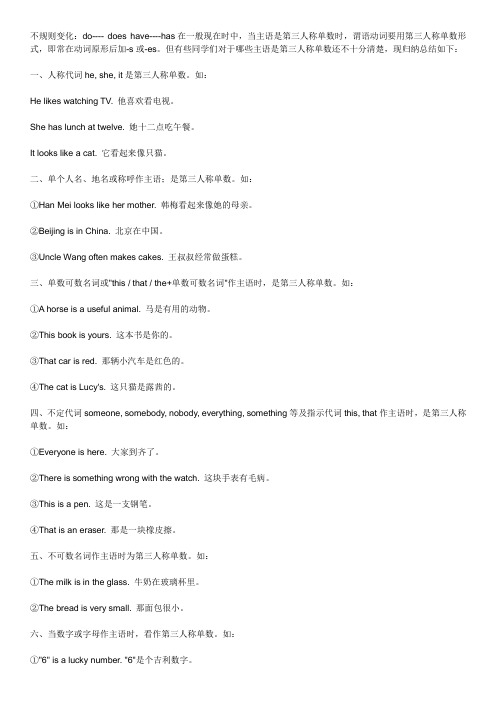
不规则变化:do---- does have----has在一般现在时中,当主语是第三人称单数时,谓语动词要用第三人称单数形式,即常在动词原形后加-s或-es。
但有些同学们对于哪些主语是第三人称单数还不十分清楚,现归纳总结如下:一、人称代词he, she, it是第三人称单数。
如:He likes watching TV. 他喜欢看电视。
She has lunch at twelve. 她十二点吃午餐。
It looks like a cat. 它看起来像只猫。
二、单个人名、地名或称呼作主语;是第三人称单数。
如:①Han Mei looks like her mother. 韩梅看起来像她的母亲。
②Beijing is in China. 北京在中国。
③Uncle Wang often makes cakes. 王叔叔经常做蛋糕。
三、单数可数名词或"this / that / the+单数可数名词"作主语时,是第三人称单数。
如:①A horse is a useful animal. 马是有用的动物。
②This book is yours. 这本书是你的。
③That car is red. 那辆小汽车是红色的。
④The cat is Lucy's. 这只猫是露茜的。
四、不定代词someone, somebody, nobody, everything, something等及指示代词this, that作主语时,是第三人称单数。
如:①Everyone is here. 大家到齐了。
②There is something wrong with the watch. 这块手表有毛病。
③This is a pen. 这是一支钢笔。
④That is an eraser. 那是一块橡皮擦。
五、不可数名词作主语时为第三人称单数。
如:①The milk is in the glass. 牛奶在玻璃杯里。
(完整版)第三人称单数用法讲解及练习题

动词第三人称单数形式讲解一、什么是第三人称单数?人称可分为三类:第一人称、第二人称和第三人称第一人称:I we第二人称:you第三人称:he、she、it、they和人名类(如:Peter、Jane、my father等)结合以上知识,第三人称单数就是he、she、it和单个的某人,也包括单个的动物、东西等。
二、动词为什么要变成相应的三单形式?在一般现在时中,跟在第三人称单数后面的动词也要变成相应的三单形式,例如:I watch TV every day. 如果主语是三单,动词要变化:He watches TV every day.She watches TV every day.Jane watches TV every day.三、动词三单的变化规则1、一般情况下直接加s,如speak-speaks, like-likes, play-plays2、以s, x, sh, ch, o 结尾的加es,如wash-washes, go-goes, do-does, watch-watches3、以辅音字母+y 结尾的,改y 为i 再加es,如study-studies,try-tries4、特殊变化,如have-has四、does和doesn’t 在句子中的用法否定句:主语+don’t/doesn’t+动词原形+(其他)。
如:I don’t watch TV. 我不看电视。
当主语为第三人称单数时,要用doesn’t 构成否定句。
如:He doesn’t watch TV. 他不看电视。
注意doesn’t后面用动词原形watch,而不是watches一般疑问句:Do / Does+主语+动词原形+(其他)。
如:Do you watch TV? Yes, I do. / No, I don’t.当主语为第三人称单数时,要用does 构成一般疑问句。
如:Does she watch TV? Yes, she does. / No, she doesn’t.特殊疑问句:疑问词+一般疑问句。
一般现在时动词第三人称单数变化规则讲义及试题
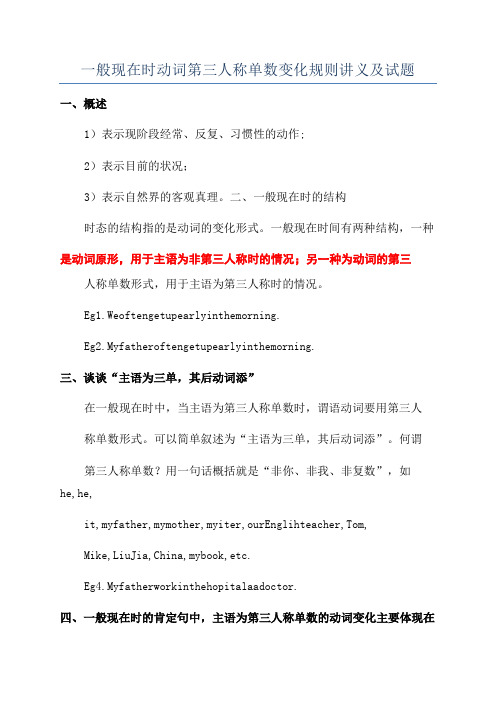
一般现在时动词第三人称单数变化规则讲义及试题一、概述1)表示现阶段经常、反复、习惯性的动作;2)表示目前的状况;3)表示自然界的客观真理。
二、一般现在时的结构时态的结构指的是动词的变化形式。
一般现在时间有两种结构,一种是动词原形,用于主语为非第三人称时的情况;另一种为动词的第三人称单数形式,用于主语为第三人称时的情况。
Eg1.Weoftengetupearlyinthemorning.Eg2.Myfatheroftengetupearlyinthemorning.三、谈谈“主语为三单,其后动词添”在一般现在时中,当主语为第三人称单数时,谓语动词要用第三人称单数形式。
可以简单叙述为“主语为三单,其后动词添”。
何谓第三人称单数?用一句话概括就是“非你、非我、非复数”,如he,he,it,myfather,mymother,myiter,ourEnglihteacher,Tom,Mike,LiuJia,China,mybook,etc.Eg4.Myfatherworkinthehopitalaadoctor.四、一般现在时的肯定句中,主语为第三人称单数的动词变化主要体现在词尾的变化上,其规律为:(与名词变成复数的变法大致相同。
)规则原形第三人称单数形式1、一般情况下,直接在动词词getgettaketake尾+playplaygueguee2、以,,h,ch,o结尾的动词,fifinihfinihe在词尾+eteachteachego和dogoe和doetudytudie3、以辅音字母+y结尾的动词,trytrieflyflie先把y变为i,再加e carrycarrieworrie4、不规则动词(特殊情况)havehabei五、一般现在时的句子转换(1)当句子中有be动词或情态动词时,则把be动词或情态动词(can,could等等)提到主语的前面变成一般疑问句;在be动词或情态动词后面加not变成否定句.例:①陈述句:Sheiatudent.一般疑问句→Iheatudent否定句→Sheinotatudent.②陈述句:Icanwim.一般疑问句→Canyouwim否定句→Icannotwim.(2)当句子中即没有be动词,也没有情态动词时,则在主语前加助动词do(you,以及复数),doe(单数he,he,it)变成一般疑问句;在主语后谓语动词前加助动词don’t(I,you,以及复数),doen’t(单数he,he,it)变成否定句,助动词后的动词要变成动词原形例:①陈述句:Wegetupat7:00everymorning.一般疑问句→Doyougetupat7:00everymorning否定句→Wedon’tgetupat7:00everymorning.②陈述句:Shehaalittlebrother.一般疑问句→Doehehavealittlebrother否定句→Shedoen’thavealittlebrother.哪些主语是第三人称单数?1、人称代词he,he,it;如:HelikewatchingTV.他喜欢看电视。
第三人称单数用法讲解及练习题
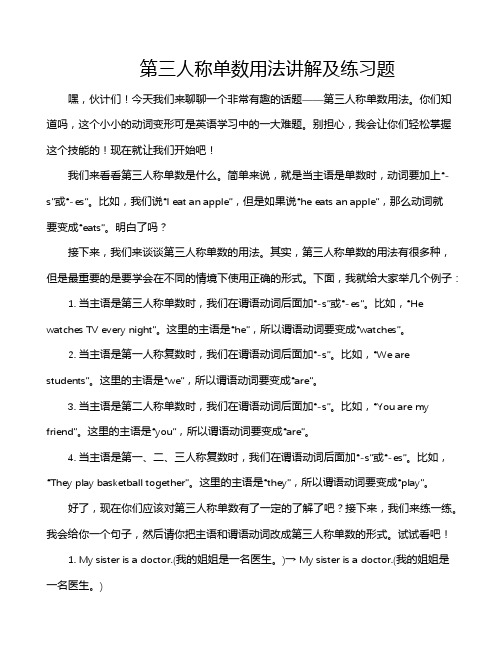
第三人称单数用法讲解及练习题嘿,伙计们!今天我们来聊聊一个非常有趣的话题——第三人称单数用法。
你们知道吗,这个小小的动词变形可是英语学习中的一大难题。
别担心,我会让你们轻松掌握这个技能的!现在就让我们开始吧!我们来看看第三人称单数是什么。
简单来说,就是当主语是单数时,动词要加上“-s”或“-es”。
比如,我们说“I eat an apple”,但是如果说“he eats an apple”,那么动词就要变成“eats”。
明白了吗?接下来,我们来谈谈第三人称单数的用法。
其实,第三人称单数的用法有很多种,但是最重要的是要学会在不同的情境下使用正确的形式。
下面,我就给大家举几个例子:1. 当主语是第三人称单数时,我们在谓语动词后面加“-s”或“-es”。
比如,“He watches TV every night”。
这里的主语是“he”,所以谓语动词要变成“watches”。
2. 当主语是第一人称复数时,我们在谓语动词后面加“-s”。
比如,“We are students”。
这里的主语是“we”,所以谓语动词要变成“are”。
3. 当主语是第二人称单数时,我们在谓语动词后面加“-s”。
比如,“You are my friend”。
这里的主语是“you”,所以谓语动词要变成“are”。
4. 当主语是第一、二、三人称复数时,我们在谓语动词后面加“-s”或“-es”。
比如,“They play basketball together”。
这里的主语是“they”,所以谓语动词要变成“play”。
好了,现在你们应该对第三人称单数有了一定的了解了吧?接下来,我们来练一练。
我会给你一个句子,然后请你把主语和谓语动词改成第三人称单数的形式。
试试看吧!1. My sister is a doctor.(我的姐姐是一名医生。
)→ My sister is a doctor.(我的姐姐是一名医生。
)2. We are students.(我们是学生。
- 1、下载文档前请自行甄别文档内容的完整性,平台不提供额外的编辑、内容补充、找答案等附加服务。
- 2、"仅部分预览"的文档,不可在线预览部分如存在完整性等问题,可反馈申请退款(可完整预览的文档不适用该条件!)。
- 3、如文档侵犯您的权益,请联系客服反馈,我们会尽快为您处理(人工客服工作时间:9:00-18:30)。
第三人称单数讲义及练习题在一般现在时中,当主语是第三人称单数时,谓语动词要用第三人称单数形式,即常在动词原形后加-s或-es。
现归纳总结如下:一、人称代词he, she, it是第三人称单数。
如:① He likes watching TV. 他喜欢看电视。
②She has lunch at twelve. 她十二点吃午餐。
③It looks like a cat. 它看起来像只猫。
二、单个人名、地名或称呼作主语;是第三人称单数。
如:①Han Mei looks like her mother. 韩梅看起来像她的母亲。
②Beijing is in China. 北京在中国。
③Uncle Wang often makes cakes. 王叔叔经常做蛋糕。
三、单数可数名词或"this / that / the+单数可数名词"作主语时,是第三人称单数。
如:①A horse is a useful animal. 马是有用的动物。
②This book is yours. 这本书是你的。
③That car is red. 那辆小汽车是红色的。
④The cat is Lucy's. 这只猫是露茜的。
四、不定代词someone, somebody, nobody, everything, something等及指示代词this, that作主语时,是第三人称单数。
如:①Everyone is here. 大家到齐了。
②There is something wrong with the watch. 这块手表有毛病。
③This is a pen. 这是一支钢笔。
④That is an eraser. 那是一块橡皮擦。
五、不可数名词作主语时为第三人称单数。
如:①The milk is in the glass. 牛奶在玻璃杯里。
②The bread is very small. 那面包很小。
六、当数字或字母作主语时,看作第三人称单数。
如:①"6" is a lucky number. "6"是个吉利数字。
②"I" is a letter. "I"是个字母练习一一.Do还是Does我来选。
1. [Do/Does]______ he watch TV at night? Yes he does.2. [Do/Does]______ you go to school everyday? No, I don’t.3. [Do/Does]______ Jack and Peter like apples?4. [Do/Does]______ Tina go swimming on Sunday?5. [Do/Does]______they play football? Yes, they ___[do/does].6. [Do/Does]______ we have a good teacher? Yes, we ____[do/does].7. [Do/Does]_____ they jump rope ? No, they ___[do not/does not].8. [Do/Does]_____your dog walk in the zoo?9. [Do/Does]____ I have a big nose? No, you _____[do not/does not].10. [Do/Does]____ your cats eat fish? Yes, they _____.[do/does].11. [Do/Does]_____ their mothers go shopping? No, they ____[do not/does not].12. I ___[do not/ does not] speak Japanese. [Do/Does] _____you speak Japanese?二.请用 have或has填空。
1.I ________ a nice picture.2.He ________ a good friend.3.They _________ some kites.4.We ________ some flowers.5.She __________ a duck.6.My father __________ a new bike.7.Her mother _________ a vase.8.Our teacher _________ an English book.9.Our teachers _________ a basketball.10.Their parents __________ some story books.11.Nancy _______ many skirts.12.David ________ some jackets.13.My friends ________ a football.14.What do you ________ ?15.What does Mike ________ ?三.请用动词的适当形式填空。
1.Let him _____(play)basketball.2.Everyone_____(know)what he really like.3.Those girls____(be)my sister.4.That girl_____(call)me every Sunday.5.How___(do)she_____(spell)the word?6. He________ TV every evening. (watch)7. We always ________ to school on foot. (go)8. Tom, with his classmates, often ______ football after school. (play)9. Your shoes _______ under the bed. (be)10. ______ here and ______ by me. (come, stand)11. His uncle usually _________ to work by bus. (go)12. I always ______ up at six in the morning.(get)13. John ________ like his father. (look)四.否定句:在动词前+doesn't或don't.1.She_____ _____(do)her homework every day.2.He_____ _____(live)in ShangHai.3.He_____ _____(need)a pair pf shoes.4.Danny_____ _____(see)the apple tree?5.She_____ _____(come)from America.6.The girl_____ _____(look)out of the window and sees many bieds in the sky.五.请用动词的适当形式填空。
1._____the desk_____(have)four legs?Yes,it does.2._____she____(do)her homework every day?Yes,she does.3._____he_____(live)in Huanggang?No,he doesn't.4._____he_____(need)a pair of shoes?NO,he doesn't.5.Does Danny_____(see)the apple tree?6._____she_____(come)from America?Yes,she_____.7._____the girl_____(look)out of the window and sees many birds in the sky?No,she_____.8. Jenny runs home and_____(sit)on the chair?六.请选出正确的答案:1. She (like / likes) to play football.2. He (like / likes) drinking milk.3. I (like / likes) to watch TV.4. We (like / likes) to play badminton.5. They (like / likes) to sing songs.6. She (read / reads) books every day.7. He (play / plays) computer games every day.8. It (listen / listens) to the radio every day.9. Linda (draw / draws) pictures every day.10. Jane and Linda (play / plays) football every day.七、选择题:1. I to school every day.A. goB. goesC. going2. He teeth every morning.A. brushB. brushesC. brushing3. The birds singing.A. likeB. likesC. like to4. What does Lily doing?A. likeB. likesC. to5. you like eating apples?A. DoB. DoesC. Doing6. he swim every afternoon?A. DoB. DoesC. Doing7. Tom likes in the classroom.A. singingB. singC. to singing8. –Does Sally like swimming?--No, she .A. doB. doesC. doesn`t9. Peter and Mary milk every day.A. drinkB. drinkingC. drinks10. they read English every day?A. DoesB. AreC. Do八、把下列句子变为否定句:1. She draws pictures every day.2. We like playing football.九、把下列句子变为一般疑问句,并做肯定回答。
